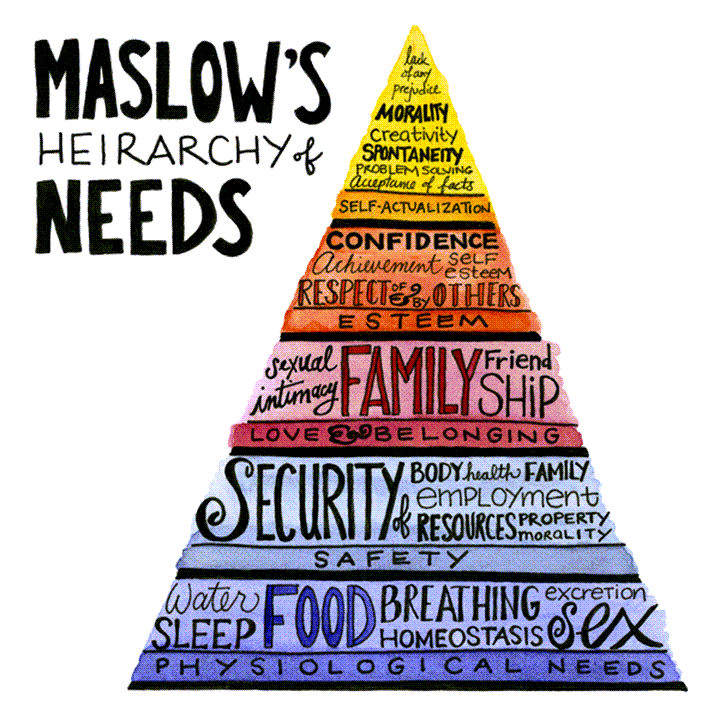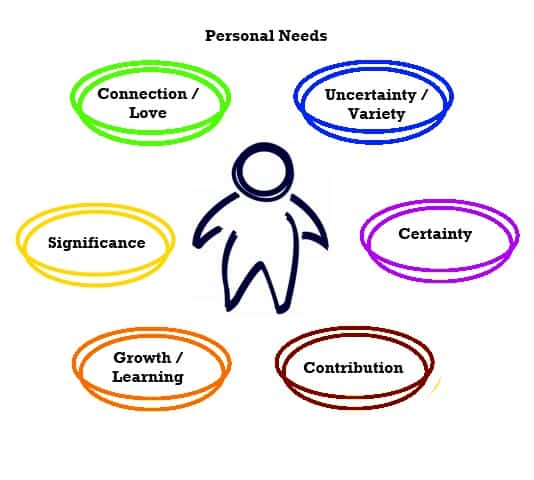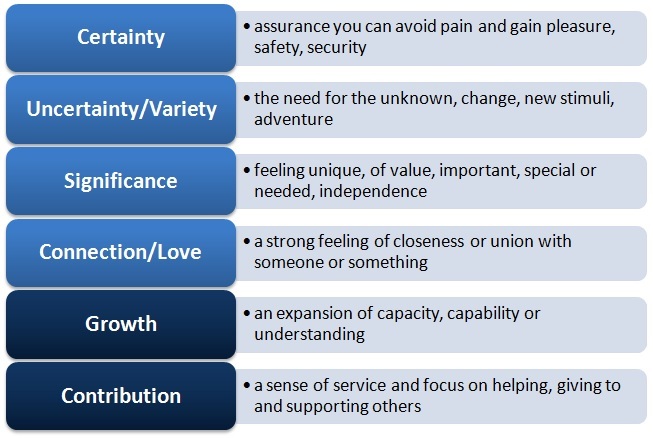When the Need for Significance is Important to You

Let’s first review Abraham Maslow’s theory of human needs. In 1943, Abraham Maslow proposed the hierarchy of psychological needs, illustrating an order of human motivation.
It is often depicted as a pyramid because Maslow initially suggested that we must satisfy our Physiological Needs first, followed by our need for Safety, Love, and a Sense of Belonging, then Self-Esteem, and finally, Self-actualization in that order.
Maslow later clarified that the order in the hierarchy “is not nearly as rigid” as he originally implied.
For example, for some, the need for Self-Esteem could be more important than the need for Love. For others, the need for creative fulfillment may supersede even the most Basic Needs.

For these reasons, Cloé Madanes, a world-renowned innovator and teacher of family and strategic therapy, separated the Emotional areas from the Physical and reworked the needs into “The Six Human Needs.“
Cloé explains that the Six Human Needs are not “Desires” but actual “Psychological Needs” that we continually try to satisfy consciously and subconsciously.
Your needs influence your deepest motivations and determine how you prioritize your decisions and actions throughout your life.
If you try to meet those needs that are not in line with your values, you will experience conflict and discontent.
Conversely, when you can align your needs with your highest values, you will feel more fulfilled and complete.

The Six Human Needs work in pairs: Certainty with Variety, Significance with Love and Connection, and Growth with Contribution.
The first two pairs are in constant search of balance.
When you feel that you don’t have enough of one of the needs when you have too much of the other.
On the other hand, the bottom two needs, Growth, and Contribution, can grow separately or together.
What is the Need for Significance?

- You believe that happiness comes from feeling respected and essential.
- It would be best if you were considered unique and special.
- You need people to look up to you and even fear you to a certain extent.
The need for Significance means continually striving to feel important, memorable, unique, and worthy.
You have all these goals you would like to achieve, so many incredible skills you would like to develop, and a respected status you would like to pursue.
All this provides you with Significance and a sense of accomplishment.
When you gain Significance compared to others, you reach a stage where you feel more important and worthy.
You feel more significant when you achieve something, build something, and learn something, or sometimes when you tear other people down.
The need for Significance can help you achieve more, do more, and become the person you desire to be.
All professional athletes would probably admit that the need for Significance is a big part of their careers. It’s perhaps one of the most important influential factors in every decision they make.
On the other hand, the need for Significance can be used for evil purposes.
It can hurt people or give them an unfair advantage. Take, for example, a bully. A bully bullies other people to make them feel important, significant, and worthy.
We must accept that we live alongside others when everything is said and done.
Society is built upon relationships, connection, mutual respect, and Love.
This is important because too much Significance can lead to separation anxiety and loneliness.
How Significance Serves You
- You work hard at being different, memorable, and unique.
- You strive to be a leader.
- You do whatever is necessary for people to look up to, respect, and admire you.
- You never want to be a follower.
How Significance Hurts You
- Sometimes, Love is more important than respect.
- It’s challenging to love someone who always has to feel important.
- Humility is an important virtue.
- Being admired by many but loved by a few may not be conducive to happiness.
- “Heavy lies the head that bears the crown” — Shakespeare.
- People sometimes dislike you because they see you as arrogant.
- You have to work at being respected and admired constantly.
- You have trouble letting Love flow when you don’t feel it necessary.
- You can come across as cold and uncaring.
- You often find it challenging to have fun.
- You can be seen as close-minded.
- You have trouble relating to others because you focus on differences rather than commonalities.
- You’re overly concerned with hierarchical pecking orders.
Significance Focus
- You focus on what to do to appear unique, different, and essential.
- You will do almost anything to preserve your uniqueness.
- You focus on playing the part of someone exceptional.
- You need to feel proud of yourself.
- You have high standards, and you live by them.
- You evaluate yourself as compared to others.
- It would be best if you were heard, and sometimes “heard” to you means being obeyed.
Significance Energy
- You constantly ask yourself whether people respect you and admire you.
- You’re watchful to correct any signs of lack of respect.
- You need to feel that you make a difference in any situation.
- You’re disciplined and competitive, and you can be a perfectionist.
Significance Health
- If your sense of Significance is tied to your appearance, endurance, and strength, you will do whatever it takes to stay fit and healthy.
- You may injure yourself by overdoing it while exercising or practicing a sport.
Significance Avoidance
- You avoid people who don’t admire you or treat you with respect.
- You avoid situations where you can’t feel that you’re critical.
- You don’t tolerate rejection.
- You will do anything to avoid being overshadowed by others.
- You hate losing face.
Significance Strengths
- You work hard and strive for the respect and admiration you crave.
- You’re willing to take responsibility to the point of self-sacrifice.
- You’re relentless in accomplishing your goals.
- You’re a leader.
- You stand up for what you believe in.
- You’re not afraid of risk or confrontation.
Significance Communication Style
- You like to talk about different projects and adventures.
- You can be so enthusiastic in your conversation that you forget to listen to the other person or to ask their opinion.
- Sometimes, you become restless and need to stand up and walk around during a conversation.
- You frequently use fear, instability, change, chaos, entertainment, suspense, exertion, surprise, conflict, and crisis.
Significance Stress
- You are stressed when you lack the time or means to engage in new challenges and adventures.
- A routine life stresses you.
- You’re upset if your physical condition prevents you from participating in activities you like.
- Restrictions on your freedom are very stressful for you.
Significance Defensiveness
- You get defensive when someone attempts to impose routines or schedules or to restrict your social life.
- You can get angry when people criticize your desire for adventure and entertainment.
Significance Emotions
- You like to feel excited, thrilled, exuberant, joyful, and adventurous.
- You do everything possible to avoid boredom.
- Your ability to experience a broad range of emotions makes it easy to empathize with others.
- You know you can experience what they are experiencing.
Significance Goal
Your Goal is to be loved for who you are and not because of your accomplishments or because of the respect and admiration of others.
What to do?
- You must learn to value Love and connection more than respect and admiration.
- You need to learn to be humble and practice patience.
- It would be best if you noticed when your standards are too high.
- You need to self-sacrifice less and love yourself more.
- You need to get involved in experiences where I won’t get any admiration or particular respect.
- You need to work less and love yourself more.
- You need to indulge in pleasurable experiences just for the sake of pleasure.
- You need to relax.
- You need to pay attention to feelings and relationships.
What interferes with your Goal?
- Your constant need to feel unique and essential interferes with your Goal.
- Your high standards and your willingness to sacrifice interfere with your Goal.
How can others support you?
- Others can help you achieve your Goal by introducing you to interesting, challenging, or fun experiences in which you are not an expert.
- They can reassure you that they love you for who you are and not your accomplishments.
- They can remind you to slow down and encourage you to work less and play more.
Significance Advice
- You need to get involved in experiences where you won’t get any admiration or particular respect.
- You need to work less and love yourself more.
- You need to indulge in pleasurable experiences just for the sake of pleasure.
- You need to relax.
- You need to pay attention to feelings and relationships.

